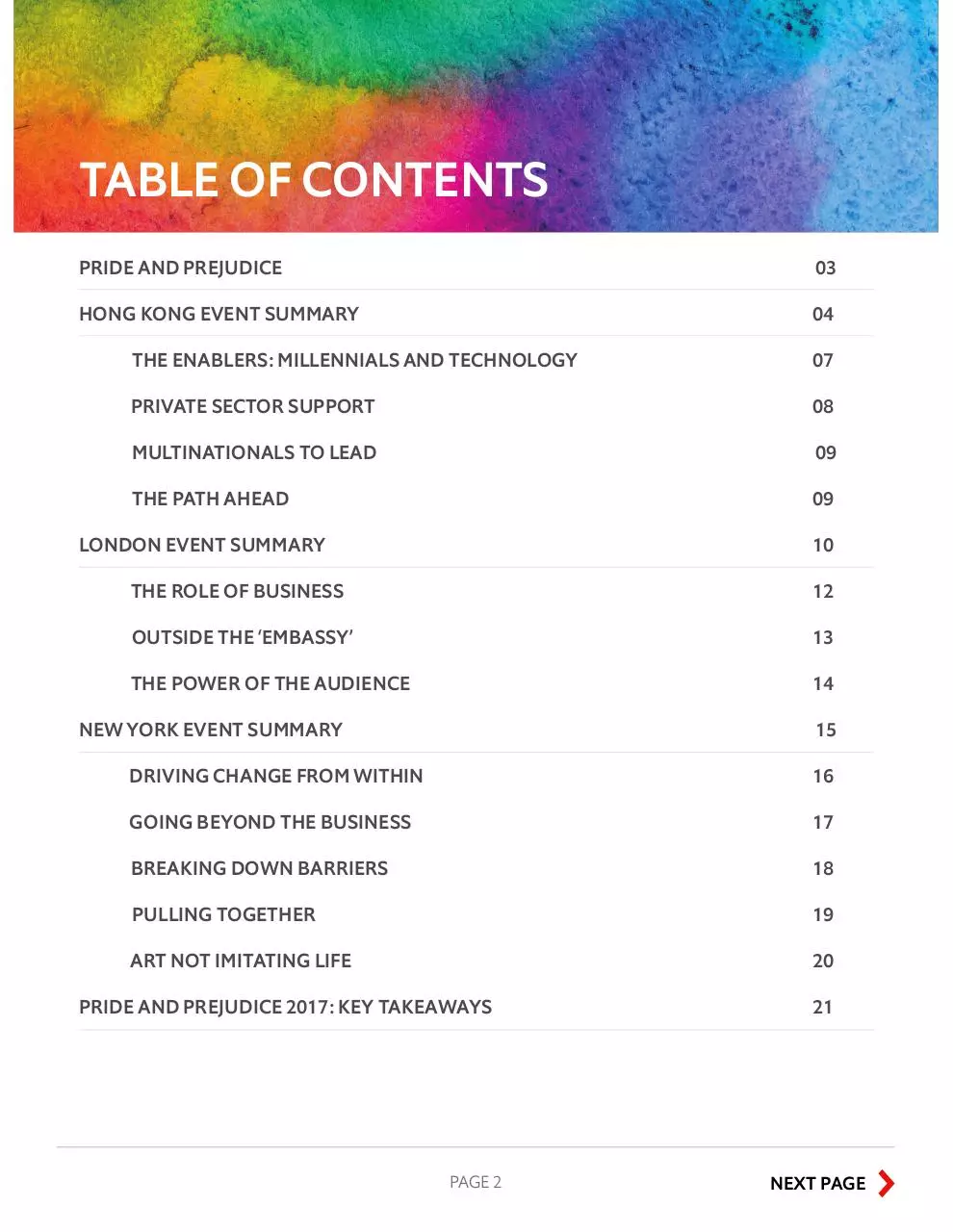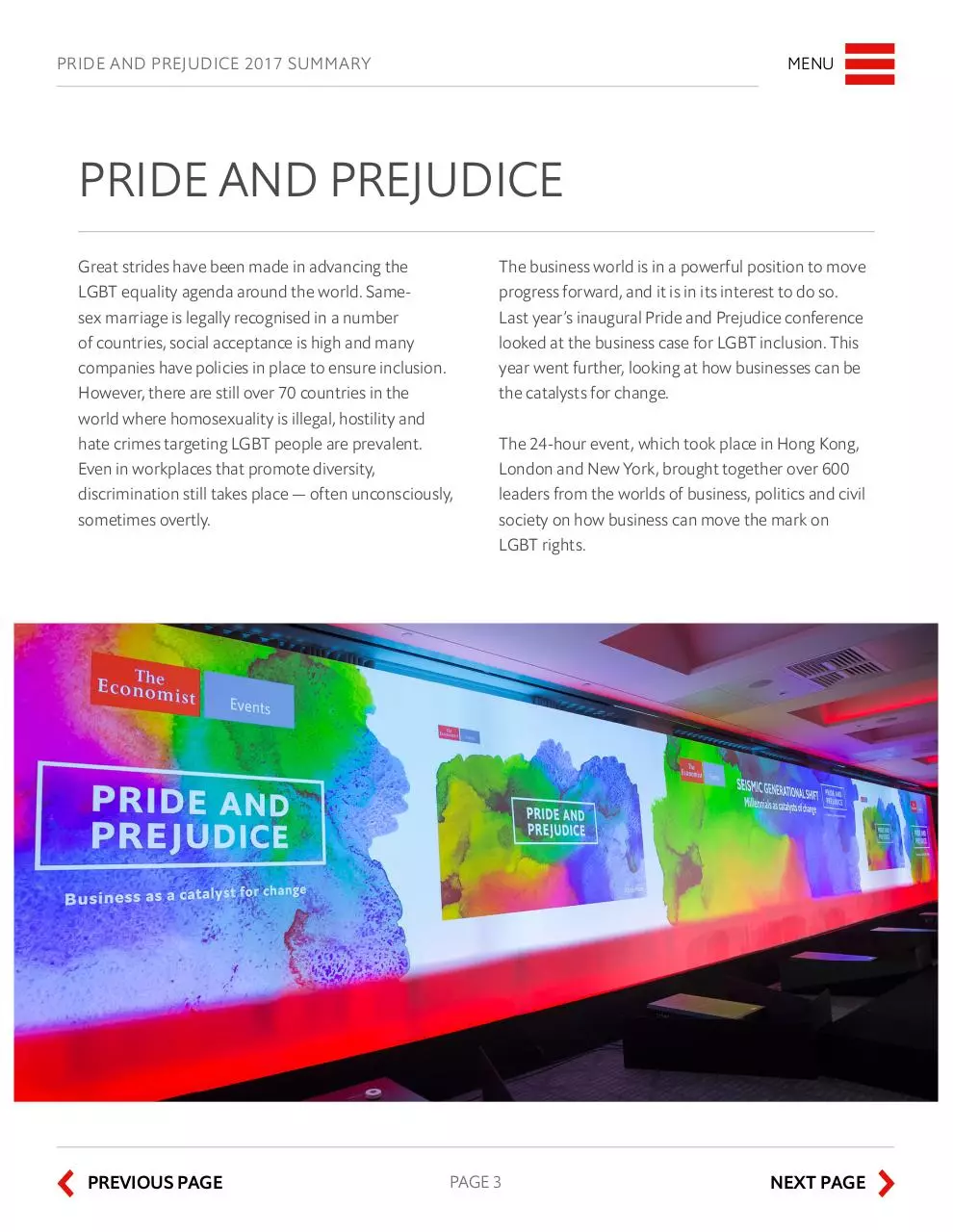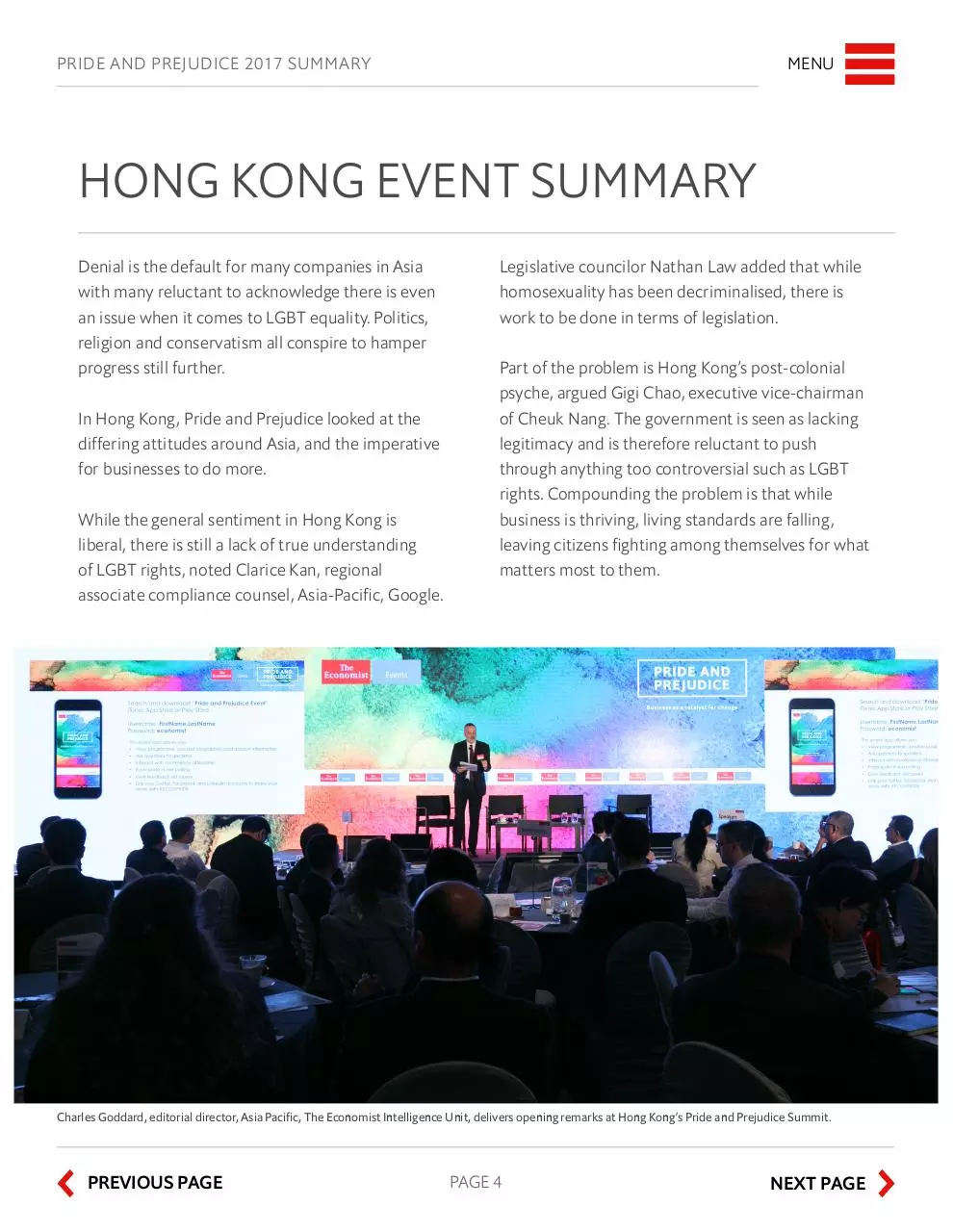PRIDE 2017 Summary (PDF)
File information
Title: P&P_2017_ebook_allcitysummary_Final4.pdf
This PDF 1.3 document has been generated by Preview / Mac OS X 10.11 Quartz PDFContext, and has been sent on pdf-archive.com on 19/05/2017 at 06:27, from IP address 119.225.x.x.
The current document download page has been viewed 559 times.
File size: 28.9 MB (22 pages).
Privacy: public file





File preview
PRIDE AND PREJUDICE 2017 SUMMARY
MENU
M A R CH 2 3 R D 2 0 17 | H O N G KO N G LO N D O N N EW YO R K
PAGE 1
PRIDE AND PREJUDICE 2017 SUMMARY
MENU
TABLE OF CONTENTS
PRIDE AND PREJUDICE
03
HONG KONG EVENT SUMMARY
04
THE ENABLERS: MILLENNIALS AND TECHNOLOGY
07
PRIVATE SECTOR SUPPORT
08
MULTINATIONALS TO LEAD
09
THE PATH AHEAD
09
LONDON EVENT SUMMARY
10
THE ROLE OF BUSINESS
12
OUTSIDE THE ‘EMBASSY’
13
THE POWER OF THE AUDIENCE
14
NEW YORK EVENT SUMMARY
15
DRIVING CHANGE FROM WITHIN
16
GOING BEYOND THE BUSINESS
17
BREAKING DOWN BARRIERS
18
PULLING TOGETHER
19
ART NOT IMITATING LIFE
20
PRIDE AND PREJUDICE 2017: KEY TAKEAWAYS
PAGE 2
21
NEXT PAGE
PRIDE AND PREJUDICE 2017 SUMMARY
MENU
PRIDE AND PREJUDICE
Great strides have been made in advancing the
LGBT equality agenda around the world. Samesex marriage is legally recognised in a number
of countries, social acceptance is high and many
companies have policies in place to ensure inclusion.
However, there are still over 70 countries in the
world where homosexuality is illegal, hostility and
hate crimes targeting LGBT people are prevalent.
Even in workplaces that promote diversity,
discrimination still takes place — often unconsciously,
sometimes overtly.
PREVIOUS PAGE
The business world is in a powerful position to move
progress forward, and it is in its interest to do so.
Last year’s inaugural Pride and Prejudice conference
looked at the business case for LGBT inclusion. This
year went further, looking at how businesses can be
the catalysts for change.
The 24-hour event, which took place in Hong Kong,
London and New York, brought together over 600
leaders from the worlds of business, politics and civil
society on how business can move the mark on
LGBT rights.
PAGE 3
NEXT PAGE
PRIDE AND PREJUDICE 2017 SUMMARY
MENU
HONG KONG EVENT SUMMARY
Denial is the default for many companies in Asia
with many reluctant to acknowledge there is even
an issue when it comes to LGBT equality. Politics,
religion and conservatism all conspire to hamper
progress still further.
In Hong Kong, Pride and Prejudice looked at the
differing attitudes around Asia, and the imperative
for businesses to do more.
While the general sentiment in Hong Kong is
liberal, there is still a lack of true understanding
of LGBT rights, noted Clarice Kan, regional
associate compliance counsel, Asia-Pacific, Google.
Legislative councilor Nathan Law added that while
homosexuality has been decriminalised, there is
work to be done in terms of legislation.
Part of the problem is Hong Kong’s post-colonial
psyche, argued Gigi Chao, executive vice-chairman
of Cheuk Nang. The government is seen as lacking
legitimacy and is therefore reluctant to push
through anything too controversial such as LGBT
rights. Compounding the problem is that while
business is thriving, living standards are falling,
leaving citizens fighting among themselves for what
matters most to them.
Charles Goddard, editorial director, Asia Pacific, The Economist Intelligence Unit, delivers opening remarks at Hong Kong’s Pride and Prejudice Summit.
PREVIOUS PAGE
PAGE 4
NEXT PAGE
PRIDE AND PREJUDICE 2017 SUMMARY
MENU
Hong Kong is bidding for the 2022 Gay Games
and such events will help widen acceptance, but
the business world must play a bigger part: “It is
up to businesses to uphold human dignity and set
a benchmark for what is acceptable in how we
treat colleagues and how we can create vibrant
workplaces that make Hong Kong people proud,”
Ms Chao said.
birth on legal documents. However, the country has
made huge progress and recently elected its first
transgender congresswoman.
In the Philippines, progress has been made, but
the picture is mixed. Marianne Hontiveros, chair
of Philippines AirAsia, explained that while social
attitudes are liberal, it has been in a limited way
with the expectation that LGBT people will only
work in certain careers such as beauty salons. Samesex marriage is not recognised and a transgender
person still has to carry their designation of sex at
Oyungerel Tsedevdamba, former minister of
culture, sports and tourism of Mongolia, discussed
In India, Parmesh Shahani, head of Godrej India
Culture Lab, explained that while it is not criminal to
be gay, same-sex acts are criminalised. Homophobic
comments and discrimination are common.
changing attitudes in the country. In 2009, as the
first human-rights advisor to the president, Ms
Tsedevdamba developed an argument for LGBT
equality: it was an uphill struggle at a time when
even the term LGBT would not be accepted as it
was made up of foreign words. Mongolia now hosts
From left to right: Jon Fasman, South-East Asia bureau chief, The Economist; Marianne Hontiveros, chair, Philippines, AirAsia; Michael Ebeid, chief executive and
managing director, SBS
PREVIOUS PAGE
PAGE 5
NEXT PAGE
PRIDE AND PREJUDICE 2017 SUMMARY
MENU
LGBT events like Pride, and Ms Tsedevdamba added
that things are moving in the right direction socially,
if not politically: publicly supporting LGBT issues
won’t get you elected, she said.
Paerin Choa, spokesperson, PinkDot SG, discussed
how PinkDot was formed to “change the hearts and
minds of Singaporeans” on LGBT issues. Protest
“
Until a person knows someone
close who is gay, it will
always remain an argument
in their head. But it changes
everything when they see
it is actually someone’s life.
”
— Pauline Ong
Executive pastor
Free Community Church
PREVIOUS PAGE
came in the form of asking allies to wear pink and
form a dot for a photo opportunity. The number of
participants has grown to 28,000. The hope is that
by showing society’s acceptance, it will help change
laws. He adds that while the government has always
said it is not anti-gay, it is afraid of relaxing rules
on public assembly and sees LGBT issues as one
of public controversy.
Pauline Ong, executive pastor at the Free
Community Church, said that in Singapore there
is a vocal minority who are anti-LGBT and that
gets heard loudly, while the progressive religious
majority is silent. “These people are moderate and
accepting but still trying to crystallise their stance
and not willing to stand up in public.”
Ms Ong has been criticised in that she is gay and
Christian. “I used to think I was a contradiction,
but what I have, this intersection, is a gift. All these
things about being gay and Christian we haven’t
explored in a deep way.” By coming out, it helps
spread the message. Having a friend or relative
that is LGBT can remove prejudices. “Until a
person knows someone close who is gay, it will
always remain an argument in their head. But it
changes everything when they see it is actually
someone’s life.”
PAGE 6
NEXT PAGE
PRIDE AND PREJUDICE 2017 SUMMARY
MENU
The enablers: millennials and technology
Delegates looked at some of the drivers for change
in advancing LGBT rights. One is millennials who
typically have more liberal attitudes and are more
likely to support the LGBT agenda. In Asia, the
fact that millennials now have access to better
education, have perhaps studied in countries that
are more progressive on the issues and can see the
wider world via social media, has led to greater
awareness on what a liberal society should be.
Technology is a great enabler in helping LGBT
people to connect and communicate and
collaborate, said Yoichiro Hirano, group chief
executive of Infoteria. He argued that the use of
artificial intelligence could help eliminate human
prejudice: machines are not sexist, racist or
otherwise discriminatory.
Rica Paras, senior manager, technology at Accenture,
and chairwoman of the Society of Transsexual
Women of the Philippines, said that access to
technology was how she herself came to terms with
her sexuality.
But Google’s Ms Kan said that while technology has
the power to remove biases, we need caution in
how we programme the technology: an algorithm
that filters CVs and looks for what has been
successful in a business before, may for example,
end up excluding people that don’t have a certain
educational background.
From left to right: Charles Goddard, editorial director, Asia-Pacific, The Economist Intelligence Unit; Nathan Law, legislative councilor, Hong Kong; Clarice Kan,
regional associate compliance counsel, Asia-Pacific, Google; Rica Paras, senior manager, technology, Accenture
PREVIOUS PAGE
PAGE 7
NEXT PAGE
PRIDE AND PREJUDICE 2017 SUMMARY
MENU
Private sector support
The conference examined the role and
responsibility of businesses in pushing LGBT
equality. While some Asian organisations are
content to stick their heads in the sand, others
are leading the way.
Cascading the positive message throughout the
organisation is crucial. Philippines AirAsia has told
staff that the new steward must be welcomed.
Employees feeling uncomfortable about the issue
should see their manager for access to mentoring
to ‘enlighten’ them.
While Godrej has been in existence for over 100
years, its attitudes are progressive. Mr Shahani said
its activities include the likes of anti-harassment
measures and supporting a transgender dance
group. He talked of the importance of leadership
in directing the issues. “In Asia it is very hierarchy
oriented. Things happen more quickly if they come
from top.”
Philippines AirAsia has also taken a strong stance
in support of LGBT issues. Ms Hontiveros said
that while the company has never excluded LGBT
people, it decided to actively invite LGBT people to
apply. “When you are silent, people aren’t sure and
wonder if they will be welcome,” she said. This year
saw two transgender people apply as cabin crew,
one of which is about to have training. She added
that the airline industry is very visible and can be
a powerful agent of change.
PREVIOUS PAGE
Some businesses absolutely demand that their
employees take equality seriously. Wanda Tung,
general counsel, Asia ex-Japan, Nomura, said the
company has a global code of ethics, and every
employee has to reaffirm their agreement with the
code yearly. It has an active allies programme: even
something as simple as a sticker on a supporter’s
computer gives a very clear sign of an open
environment.
PAGE 8
“
The airline industry is very
visible and can be a powerful
agent of change.
”
NEXT PAGE
PRIDE AND PREJUDICE 2017 SUMMARY
MENU
Multinationals to lead
Delegates spoke of the role of multinationals
operating in Asia: they need to set an example
to local firms and show them how policies can work
in practice, said Ms Paras.
of leverage is appropriate. But with governments it
is different: this requires working with them to show
that they have the same goals to drive innovation
and growth.
Multinational organisations can have a big influence.
Louise Chamberlain, country director, Vietnam,
United Nations Development Programme, said, “They
have the opportunity to bring corporate policies to
many different countries. This is a huge advantage
in places where these things are socially difficult
to address.”
Delegates heard from several multinationals that
operate in Asia and how they spread the diversity
message. Jeff Bullwinkel, associate general counsel
and director of corporate, external and legal affairs,
Asia Pacific and Japan, Microsoft, talked of the
importance of storytelling. People’s personal tales
can be powerful.
The path ahead
When politics is moving too slowly, or even against
the tide of progress, then the role of business
becomes paramount. Collaboration can be effective.
Mr Shahani urged companies to join forces to make
their voices heard. “If you come out as a company
about something you believe in you can make a
difference,” he said. “You have to have allies — other
business, NGOs, politicians and you need a coalition
to move it forward. But if you take this leap of faith,
others will take the leap with you.”
Bruce Larson, managing director and head of human
capital management at Goldman Sachs, looked at
the power of connecting ally networks within an
organisation. The challenges of underrepresented
groups can often overlap and working together
means they can accelerate the causes. Mentoring and
advocacy for an individual can also be transformative:
they have someone to both confide in and speak on
their behalf.
But how far businesses should use their leverage
outside of the organisation to advance the cause
is debated. Mr Bullwinkel explained that Microsoft
expects its vendors to embrace diversity and that sort
PREVIOUS PAGE
PAGE 9
“
You have to have allies — other
business, NGOs, politicians,
and you need a coalition to
move it forward. But if you
take this leap of faith, others
will take the leap with you.
”
— Parmesh Shahani
Head of
Godrej India Culture Lab
NEXT PAGE
Download PRIDE 2017 Summary
PRIDE 2017 Summary.pdf (PDF, 28.9 MB)
Download PDF
Share this file on social networks
Link to this page
Permanent link
Use the permanent link to the download page to share your document on Facebook, Twitter, LinkedIn, or directly with a contact by e-Mail, Messenger, Whatsapp, Line..
Short link
Use the short link to share your document on Twitter or by text message (SMS)
HTML Code
Copy the following HTML code to share your document on a Website or Blog
QR Code to this page

This file has been shared publicly by a user of PDF Archive.
Document ID: 0000599013.